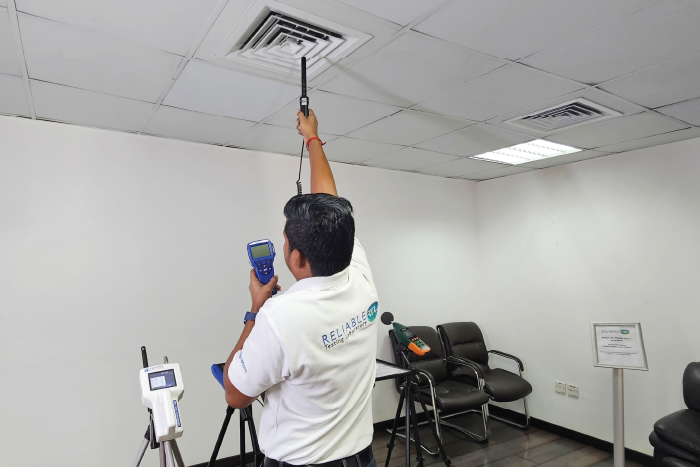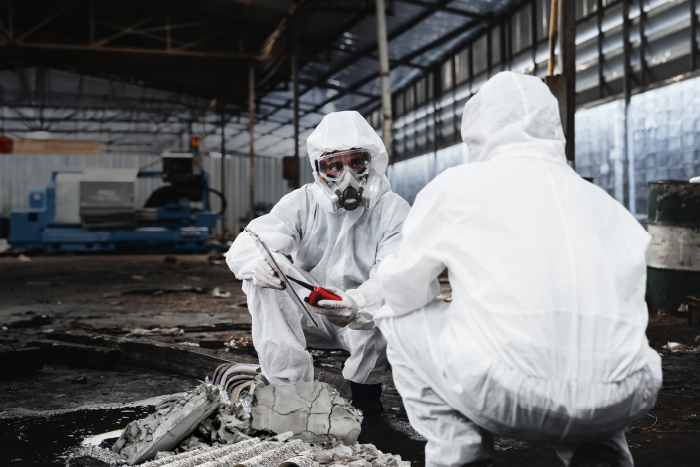
Is the Air You Breathe Safe? Protect Your Health with Our Indoor Air Quality Testing in Dubai
Is the Air You Breathe Indoors Safe?
We often focus on the quality of the air outside, but did you know that indoor air can be just as harmful?
Poor indoor air quality can lead to health problems like headaches, allergies, and breathing issues.
In Dubai, where the heat and humidity can create perfect conditions for mold and dust buildup, it’s even more important to make sure the air in your home or office is clean.
Indoor air quality testing in Dubai helps identify harmful pollutants and ensures a healthier environment for everyone.
Protect Your Health with Indoor Air Quality Testing (IAQ) in Dubai?
Indoor Air Quality Testing (IAQ) is the process of measuring and analyzing the air inside buildings to identify harmful pollutants.
This testing helps determine the presence of allergens, mold, dust, volatile organic compounds (VOCs), carbon dioxide, and other airborne particles that can affect health.
At Reliable Testing Laboratory, we collect air samples and analyze them to detect pollutants that may not be visible to the naked eye but can still pose health risks.
Regular IAQ testing ensures that indoor environments, whether at home or in the workplace, remain safe and healthy to breathe.
Importance of Indoor Air Quality Testing in Dubai
In a city like Dubai, where rapid urbanization and extreme weather conditions are common, indoor air quality (IAQ) testing is especially important. The high temperatures, humidity, and frequent dust storms in the region can contribute to the buildup of pollutants like dust, mold, and allergens in homes and businesses.
Poor air quality can lead to various health issues, such as respiratory problems, allergies, and fatigue, which are particularly concerning for vulnerable individuals, like children, the elderly, and people with pre-existing conditions. In addition, many modern buildings in Dubai are sealed tightly to keep out the heat, reducing ventilation and trapping indoor pollutants.
Regular indoor air quality testing helps identify hidden threats and allows for proactive steps to improve air quality. By detecting pollutants early, residents and businesses can take measures to maintain a healthier environment, ultimately improving overall well-being and comfort in Dubai’s challenging climate
Types Of Our Indoor Air Quality Testing Services
1. Physical Testing
Focuses on measuring physical air quality parameters such as particulate matter and gas concentrations.
- Temperature and Humidity Testing – Monitors comfort and mold prevention.
- Particulate Matter (PM) Testing – Detects airborne particles like PM2.5 and PM10, which can cause respiratory issues.
- Airborne Gas Testing – Identifies harmful gases such as carbon monoxide (CO), carbon dioxide (CO₂), and radon.
- Volatile Organic Compounds (VOC) Testing – Measures toxic chemicals in the air from solvents, paints, and furnishings.
2. Bacterial Testing
Checks for microbial contamination that can affect health.
- Airborne Bacterial Testing – Measures bacteria present in the air.
- Legionella Testing – Essential for water systems to detect Legionella bacteria, which causes Legionnaires’ disease.
- Fungal and Mold Testing – Identifies bacteria and fungi that thrive in damp environments.
3. Surface Swab Testing
Examines surfaces for microbial contamination, especially in critical environments like healthcare and food industries.
- Bacterial Swab Test – Detects harmful bacteria such as Salmonella, E. coli, and Staphylococcus aureus.
- Mold and Fungal Swab Test – Confirms the presence of mold on walls, ceilings, and HVAC systems.
- Allergen Testing – Identifies allergens like dust mites and pet dander on furniture and fabrics.
When You Should Go for Indoor Air Quality Testing
1. New Construction or Renovations
If you’ve recently built or renovated your home or office, air quality testing is essential. Construction materials, paint, adhesives, and new furniture can release volatile organic compounds (VOCs) and other harmful chemicals that affect air quality.
2. Health Symptoms
If you or anyone in your household or workplace is experiencing unexplained health issues such as headaches, allergies, coughing, fatigue, or asthma-like symptoms, poor indoor air quality could be the cause. Testing can help identify the source.
3. After Water Damage or Flooding
Mold growth can occur in damp conditions, so if your property has been exposed to water damage or flooding, it’s important to test for mold and other pollutants that thrive in wet environments.
4. Change in Ventilation
If there’s been a change in the building’s ventilation system, or if windows and doors are often kept closed to combat the heat, it could lead to the accumulation of pollutants. Testing can ensure proper airflow and air quality.
5. Visible Mold or Dust Accumulation
If you notice mold, dust buildup, or a musty smell indoors, it’s a sign that air quality could be compromised. Testing helps identify the extent of the problem.
6. To Ensure Healthy Work Environment
In commercial spaces, air quality testing ensures the workplace remains safe and conducive to productivity. Poor air quality can negatively impact employee health and work performance.
7. Before Moving Into a New Home
If you’re planning to move into a new property, conducting air quality tests can help ensure the space is safe, especially if it has been vacant for a while or poorly maintained.
Symptoms of Poor Indoor Air Quality Testing in Dubai
- Fatigue: Constant tiredness or a lack of energy, even after a full night’s sleep, can be a sign of poor indoor air quality. Pollutants like VOCs, dust, and mold can contribute to feelings of exhaustion.
- Allergies & Asthma Triggers: Dust, mold, pet dander, and pollen in the air can trigger allergic reactions or asthma attacks, leading to sneezing, congestion, and difficulty breathing.
- Eye Irritation: Dry, itchy, or red eyes are common symptoms of poor indoor air, often caused by allergens or airborne chemicals like VOCs, which irritate the eyes and respiratory system.
- Visible Mold: Mold growth in damp areas, such as bathrooms, kitchens, or poorly ventilated spaces, is a clear sign of poor indoor air quality. Mold can release spores that affect breathing and overall health.
- Headaches: Frequent or unexplained headaches can be a result of pollutants in the air, such as carbon dioxide, dust, or chemicals from paints and cleaning products, especially in areas with limited ventilation.
Air Quality Testing Procedure at Reliable Testing Laboratory
1. Initial Consultation and Site Assessment
At Reliable Testing Laboratory, We understand client concerns and specific air quality issues.
2. Air Sampling
Collect air samples from various locations (high-traffic areas, near HVAC systems, mold-prone areas). Test for common pollutants: particulate matter, VOCs, carbon dioxide, dust, and mold spores.
3. Surface Sampling
Perform surface tests (wipe or swab) to check for contaminants such as mold, bacteria, and dust.
4. Laboratory Analysis
Identify and measure pollutants, including mold spores, dust, VOCs, and other contaminants.
5. Comprehensive Reporting
Provide a detailed report with pollutant concentrations and potential health risks.
How to Improve Indoor Air Quality in Dubai
- Increase Ventilation: Open windows and use exhaust fans to promote airflow and remove
- Control Humidity: Maintain indoor humidity levels between 30-50% to prevent mold growth and maintain comfort.
- Regular Cleaning: Dust and vacuum regularly, especially with a HEPA filter, to reduce allergens and debris.
- Reduce Use of Chemicals: Avoid chemical-based cleaning products and choose eco-friendly, VOC-free alternatives.
- Remove or Treat Mold: Address any mold growth promptly to avoid mold spores that can worsen air quality.
- Add Indoor Plants: Place air-purifying plants like snake plants or peace lilies to naturally improve indoor air quality.
- Avoid Smoking Indoors: Do not smoke inside to prevent harmful tobacco smoke from contaminating the air.
- Use Natural Materials: Choose natural materials like wood or bamboo for furniture and flooring to avoid VOCs in synthetic products.
- Schedule Regular Indoor Air Quality Testing with us: Regular testing can help identify hidden pollutants, ensuring a healthier indoor environment.
Why Reliable Testing Laboratory For Accurate Indoor Quality Testing Services
- ISO Certified and Accredited: Our laboratory is proudly ISO certified and accredited, ensuring that all indoor air quality tests meet the highest international standards for accuracy and reliability.
- Comprehensive Testing Services: We offer a wide range of air quality tests, including particulate matter, VOCs, mold spores, and allergens, to assess the full spectrum of indoor air pollutants.
- State-of-the-Art Equipment: We use advanced, cutting-edge equipment and technology to detect even the smallest airborne contaminants, ensuring precise and dependable results.
- Expert Analysis: Our team of experienced professionals conducts thorough analysis and provides clear, detailed reports with actionable recommendations for improving air quality.
- Quick Turnaround: We understand the urgency of indoor air quality issues and offer fast, efficient testing with quick turnaround times for reports.
- Health and Safety Focus: Our primary goal is to help protect your health by identifying harmful pollutants that can affect respiratory health, allergies, and overall well-being.
- Customer-Centric Approach: We prioritize customer satisfaction and work closely with clients to ensure all their indoor air quality needs are met effectively.
- Trusted by Leading Organizations: Many businesses and residents in Dubai rely on our expertise for dependable indoor air quality testing, making us a trusted name in the industry.
Air Quality Index (AQI) in Dubai
The Air Quality Index (AQI) is a critical measure for evaluating the air we breathe. It provides a numerical value to communicate the level of air pollution in a specific area. In Dubai, a city known for its urbanization and desert environment, AQI levels vary due to factors such as industrial activities, traffic emissions, and natural dust storms.
Current Air Quality in Dubai
As of 2024, Dubai’s AQI is Moderate (92 US AQI). This indicates that while air quality is acceptable for the general population.
Conclusion
Ensuring the best indoor air quality is crucial for your health and well-being, especially in a city like Dubai. Reliable Testing Laboratory offers accurate, efficient, and affordable indoor air quality testing to help you create a safer and healthier environment. Don’t compromise on the air you breathe – take action today.
Contact Reliable Testing Laboratory today to schedule your indoor air quality test and protect your health.
FAQs on Indoor Air Quality Testing in Dubai
How do you detect air quality?
Air quality is detected using specialized instruments and sensors designed to measure various parameters, including Particulate Pollution ((PM 2.5μ), Particulate Pollution (PM 10μ), Total Volatile Organic Compound, Formaldehyde, Carbon Dioxide, Carbon Monoxide, Ozone, Nitrogen Dioxide, Oxygen, Temperature, Relative Humidity, Total Bacterial Count, Total Fungal Count.
Why should you have an air quality test?
Air quality testing is essential for identifying harmful pollutants like dust, mold, allergens, and chemicals that can negatively impact your health. Poor indoor air quality can lead to respiratory issues, allergies, fatigue, and other health problems. Testing helps detect these pollutants and allows you to take corrective measures to improve your environment.
Is indoor air quality testing worth it?
Yes, indoor air quality testing is worth it, especially for individuals with respiratory conditions, allergies, or sensitive health. It helps ensure a healthier living or working environment by identifying potential air pollutants that are not visible to the naked eye. Regular testing ensures that air quality stays optimal and prevents long-term health risks.
Is there a device to measure air quality?
Yes, We use the latest industrial-grade devices available in the market, which undergo rigorous interlaboratory testing and third-party calibrations to ensure the highest standards of professional and accurate air quality testing. These devices measure key parameters like particulate matter (PM2.5, PM10), VOCs, CO2, CO, ozone, and more.
What is the most common cause of poor indoor air quality?
The most common cause of poor indoor air quality is poor ventilation. Without proper airflow, pollutants like dust, allergens, volatile organic compounds (VOCs), and moisture can accumulate inside.



